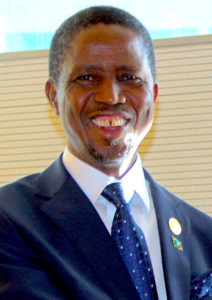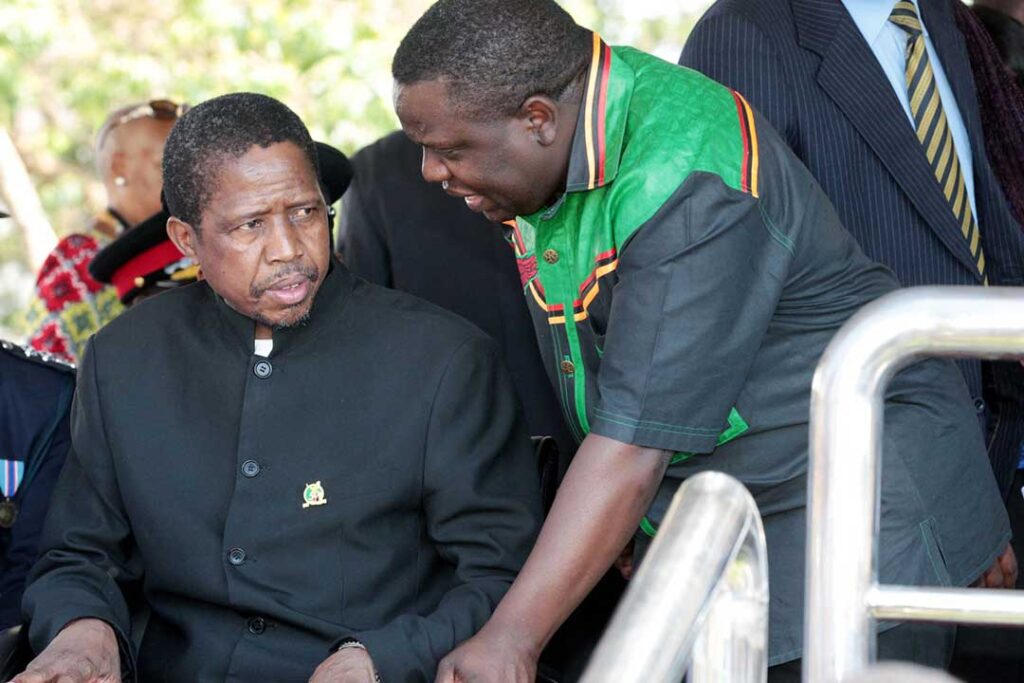Zambia’s draft constitution
Several presidents have promised a new legal charter to win votes

With Zambia’s presidential election scheduled for September next year, its current chief executive is already campaigning and making promises. “I want to hand you a new constitution,” Edgar Lungu, Zambia’s president, told expectant crowds attending his inauguration ceremony at National Heroes Stadium in Lusaka on January 25th. Dressed in a dapper blue suit and crimson tie, the 58-year-old former lawyer promised to “definitely deliver” a “people-driven” constitution in line with a roadmap that Mr Lungu released a few days before the January 20th presidential by-election. Like his Patriotic Front (PF) predecessor, Michael Sata, whose death in October had prompted the January by-election, Mr Lungu is using the prospect of a new constitution as a campaign carrot. Mr Sata was not the first to try this. For two decades, successive presidents, including Mr Sata’s predecessors, Rupiah Banda, Levy Mwanawasa and Frederick Chiluba, all of the Movement for Multiparty Democracy (MMD), have promised Zambians a new constitution to win votes.
Zambians want the existing constitution revamped because it vests too much power in the president. They also want the bill of rights to include additional entitlements for women and children, among other revisions. Yet despite verbal intent and numerous costly constitutional review committees, each has failed to deliver—much to the chagrin of the people. Unlike his predecessors, will Mr Lungu keep his promise? With a general election looming in September 2016, Mr Lungu has a small window of opportunity to consolidate support among an increasingly apathetic electorate. His PF party won the January by-election by an extremely narrow margin. Mr Lungu beat his closest rival Hakainde Hichilema, of the United Party for National Development, by just 28,000 votes, or 3.5%, according to the Electoral Commission of Zambia (ECZ). This leaves little room for error.
This pressure appears to have prompted some action. Since entering office, Mr Lungu has taken several steps to advance the constitution-making process. Most notably, his first appointment was to name Ngosa Simbyakula as justice minister and to charge him with passing the draft constitution into law. After 20 years of scrutiny, including the recent technical review committee set up by Mr Sata in 2011, Zambia now has a draft document that is generally seen as good to go. Mr Lungu released the draft on the eve of the country’s independence anniversary last October, when he was still justice minister. Mr Lungu’s government has also announced plans to amend the Referendum Act to bring it in line with the existing constitution. Certain constitutional clauses, in particular concerning the bill of rights, must be put to a public vote via a referendum before they can be amended, according to the current constitution.
The law states that a referendum needs 50% of registered voters to vote “yes” for a motion to pass, while the existing constitution stipulates 50% of eligible voters. In March, cabinet ministers approved a bill to be submitted to parliament that aligns the act with the constitution. Government plans to piggyback a referendum to change the constitution on next year’s general election. Not everyone is confident, however, that Mr Lungu will deliver on his promise. Constitution lobbying groups believe government may use technical issues like amending the act to delay a referendum. Other obstacles may block the road to a referendum next year. A census must be carried out to calculate eligible voters. Whether this is practical, time-wise or financially, before the 2016 election is questionable. Lawyers are currently debating possible ways around this, including using the last 2010 census, or projecting figures based on Zambia’s population growth rate.
Even if a referendum is held next year, it is uncertain whether it will succeed. If the act is amended to line up with the constitution, over 3m people would need to vote “yes” for the draft constitution to pass. Zambia has 6.2m eligible voters, according to the 2010 census. Yet in January’s presidential by-election just 1.7m people voted. To sidestep a referendum fl op, Mr Simbyakula has suggested that parliament amend “non-contentious” clauses not legally required to go to a referendum. These include the presidential running mate and the 50%-plus-one rules. The former would allow voters, rather than the president, to choose a vice-president. The latter would require the president to receive 50% plus one vote to win an election. Currently Zambia uses a first-past-the-post system. With the 50%-plus-one rule, the top two candidates are forced into a run-off if a presidential candidate does not win a majority.
This means that in the recent by-election, voting would have gone to a second round as Mr Lungu won only 48.3% of the votes. Previous presidents have also failed to win over 50% of the vote. Mr Sata won the 2011 election with 42.2% of the vote, while the MMD’s Mr Banda won the 2008 presidential by-election with just 40%. In March, the justice minister proposed submitting these clauses to the National Assembly as early as June. If the entire draft constitution is put to a referendum that fails, Mr Simbyakula argues, the people will have lost everything; this way at least some changes can be made. Not everyone, however, is comfortable with this option. Campaigners believe government could use this route to throw out clauses less favourable to those in power. “The people will not have a fi nal say” if this happens, said Goodwell Lungu (unrelated to the president), executive director of Transparency International Zambia (TIZ), one of several civil society groups lobbying for a new constitution.
“The suspicion has always been that if we agree to say it goes via parliament, some of these clauses can be tampered with,” he warned. Reducing the power of the executive by making political appointments more democratic—as is the intent of the running mate clause—is a core thrust of the draft constitution. Under the current constitution, the president has far reaching powers, particularly in appointments. He can hire and fire the management of various institutions and parastatals as he wishes. He also selects cabinet ministers, judges and senior management within the ministries. This calls into question the independence of these institutions and the suitability of these appointees. This approach “doesn’t work,” said Father Cleophas Lungu (also not related to Messrs Lungu), chair of the Oasis Forum, an alliance of Zambia’s Christian churches, NGOs and the Law Association of Zambia. “Right now, we have a lot of unskilled and uneducated people who are overseeing the technocrats,” he said.
To reduce the president’s powers, the draft constitution stipulates establishing independent commissions to propose, scrutinise and appoint potential candidates. It also requires the president to appoint “a prescribed number” of cabinet members, without specifying how many, from outside the legislature. The goal is to create checks and balances and to keep the executive branch separate from the legislature. Currently, the president can only appoint members of the National Assembly as ministers, who then hold two posts. Whether government has the will to put such clauses to a public vote remains to be seen. But time is ticking. In 15 months, crowds will gather once again at National Heroes Stadium to usher in a president who will govern Zambia until 2021. Whether Mr Lungu makes a repeat appearance may depend on his ability to provide the people with a new constitution. They have waited a long time.



